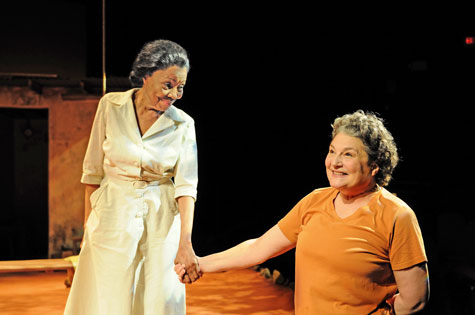
EMOTIONAL CHANGES Meek and Scurria. Photo: MARK TUREK |
Some individual experiences certainly can scale up. The heroine of Pamela Gien’s The Syringa Tree, at Trinity Repertory Company through May 30, is only a young girl, but in this mesmerizing production her experiences expand to represent communities and nations.
For dramatic purposes, it helps that she lives in South Africa, the story beginning in 1963 Johannesburg, with apartheid at its most entrenched. Trinity’s downstairs stage all but pulses with heat as an orange sky seems to reflect the red clay dirt. Stately white columns bracket a doorway at the left, while across the yard is a corrugated-roof hovel — a microcosm of slums in the shadows of skyscrapers. Between the two doorways hangs a swing, carefree innocence linking the two worlds.
When The Syringa Tree debuted in 1999, Gien, a native South African, played all 28 characters, sharing the stage with only the swing. Subsequently cast with multiple actors, it is directed by Laura Kepley at Trinity with four women. Anne Scurria begins as a six-year-old Elizabeth Grace, by the end bringing her up to present adult days. Barbara Meek principally plays the servant, Salamina, but skillfully slips into other characters, some of them male. Similar ensemble work is done by Rachael Warren and Tiffany Nichole Greene.
The intermissionless 90 minutes goes by at an unhurried pace. I’m not always absorbed by even masterful dramas, being distracted by note-taking. But when this production got suspenseful, I was absolutely enthralled, swept up emotionally. That, my friend, is theater at its most expansive.
The joyousness that Scurria maintains as the child has much to do with the evening’s cumulative effect. Actors must have great fun when called upon to let their inner child loose, but Scurria does more than stay wide-eyed and giggly. There are emotional changes that young Lizzie goes through, not all of which she understands, so conveying gradations of puzzlement is important and helps us follow and empathize with her inner workings.
Meek reminds us what a full-spectrum actor she is. Too often Meek is cast in one-dimensional roles. Her Salamina is properly deferential as a servant, moreso than Lizzie’s mother would prefer, but rather than display dignity, Meek has her transcend dignity — Salamina has more on her mind than how white people will react to her. Early on she has a baby, and she must keep that a secret if her daughter isn’t to be sent to a township to live with Salamina’s mother. The child doesn’t have the proper papers, you see. (Talk among yourselves about how this applies to the current Arizona illegal alien situation.) The huge syringa tree that Lizzie swings from is also a place to hide.
Salamina names her daughter Moliseng (Greene), and she grows into a playmate for Lizzie, to supplement the haughty Loeska (also Greene), the daughter of an Afrikaans church minister, who has too many pretty dresses for her own good. Being a little kid, Moliseng has trouble remembering not to dash around in the open where prying eyes, and the police, can spy her. A moment spookier than the similar one in E.T. is a brief interlude when flashlights are darting about in the background and indistinct voices are murmuring. When the stern white minister next door sees Moliseng and is told she is only visiting for the day, we worry.